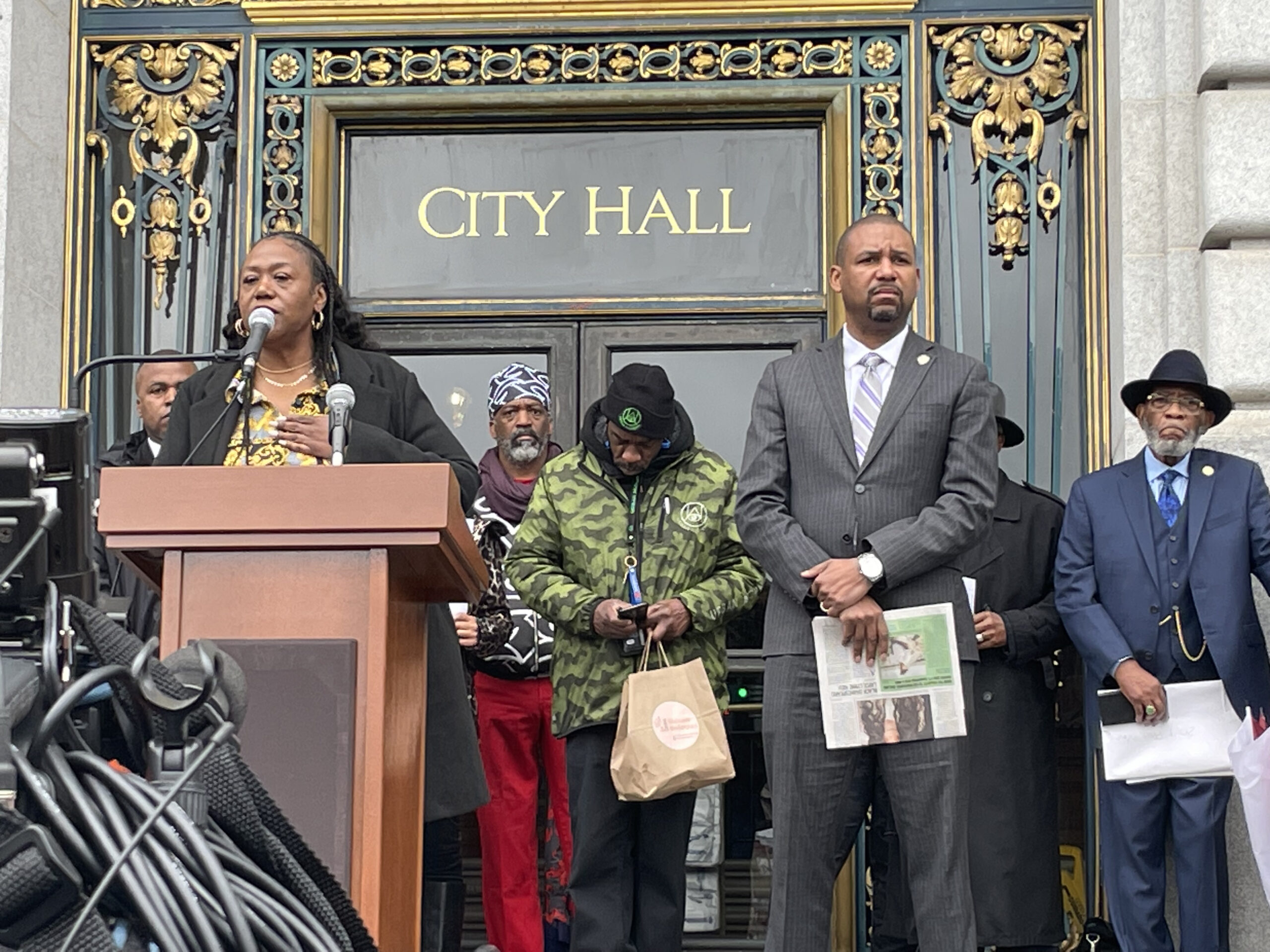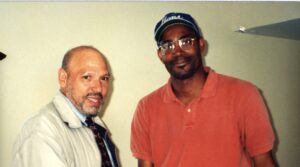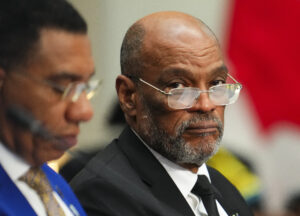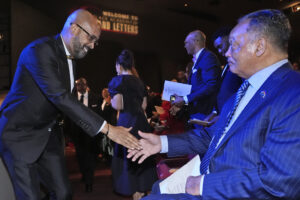SAN FRANCISCO — Supporters of the San Francisco African American Reparations Advisory Committee (AARAC) crowded onto the steps of San Francisco City Hall on Tuesday to show their backing for a proposal to pay $5 million in reparations to Black American descendants of slaves who live in the city and are at least 18.
“This is not a plea for a handout,” Tinisch Hollins, committee vice chair, told the crowd. “This is a demand that San Francisco pay what is owed for the misconduct, land theft, and overt racial discrimination that has been targeted at Black folks since they were lured to California to build this city.”
The AARAC was created to advise the San Francisco Board of Supervisors, Mayor London Breed, the San Francisco Human Rights Commission and the public, as the group works to develop a San Francisco-specific reparations plan. San Francisco is one of a handful of cities across the country reviewing reparations proposals to make whole Black residents. In 2019, the community of Evanston, Illinois, established a $10 million reparations fund.
In San Francisco, the reparations draft proposal chronicles the legacy and impact of American slavery and post-Civil War government-sanctioned discrimination against Black Americans in San Francisco.
The 60-page Draft Plan also calls for the City of San Francisco to adopt educational, financial and housing programs aimed specifically at lifting Black Americans in the city out of poverty.
“San Francisco is a sanctuary city for everyone but us,” Hollins, a native San Franciscan, told the group outside City Hall.
During her speech, Hollins started the chant, “Cut the check. … Cut the check.” The crowd joined in, ”Cut the check. … Cut the check.” Most who attended are in support of seeing Black people receive reparations for centuries of slavery and mistreatment.
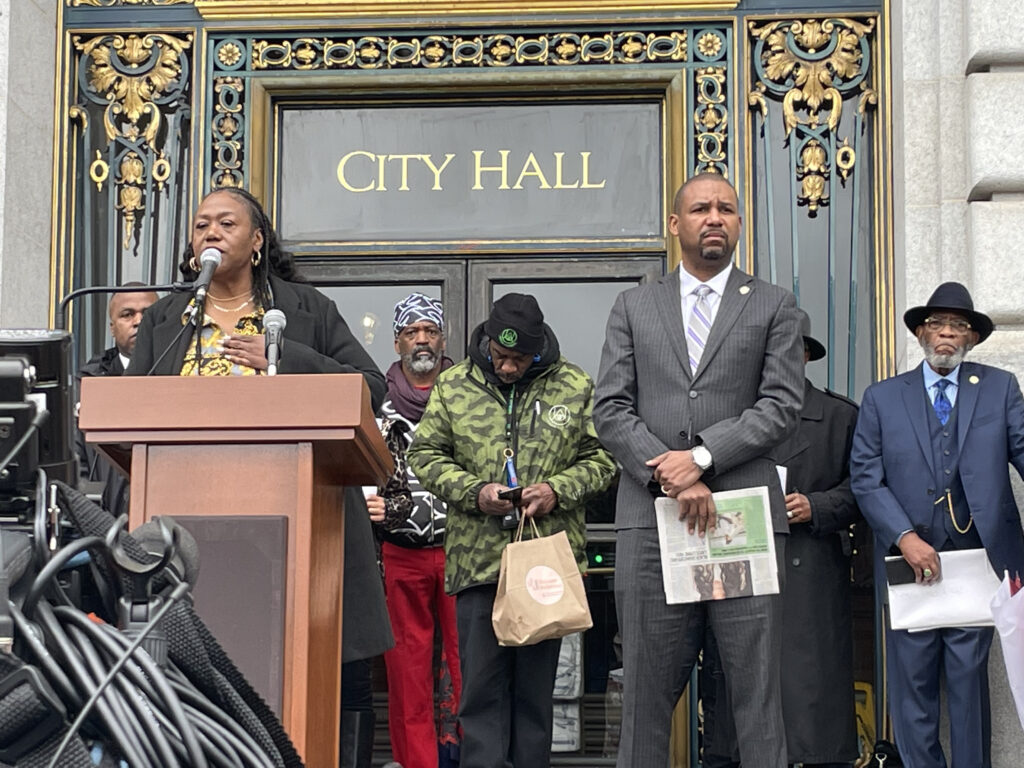
After the rally, the group entered City Hall to attend the San Francisco Board of Supervisors Special Meeting, where AARAC formally presented its Draft Plan on Reparations.
The chambers were packed, with people lining the halls and the chamber in order to speak. So many people attended that two overflow viewing areas were set up.
The AARAC’s Draft Plan is fully supported by Board of Supervisors President Shamann Walton, who wrote the legislation establishing the 15-member body.
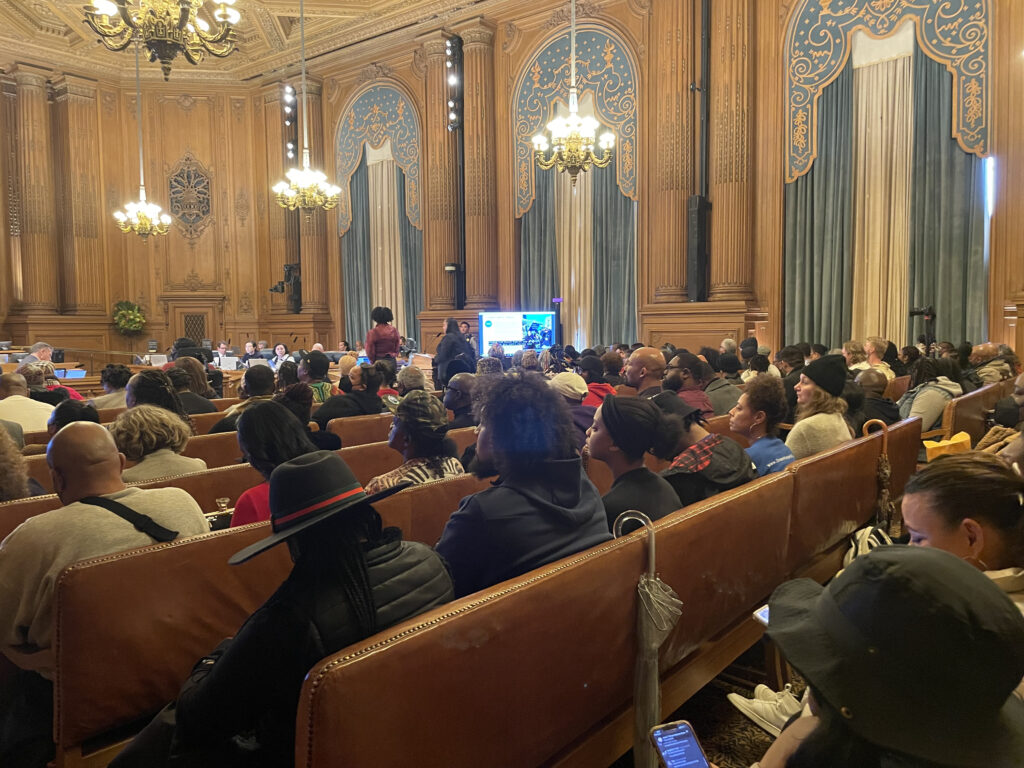
But, Supervisor Walton said, there has been plenty of backlash for members of the committee who’ve worked to prepare the plan.
“I received some of the most racist and harmful threats,” Walton said.
And Walton isn’t the only one that has been targeted.
According to the San Francisco Human Rights Commission, AARAC Chairman Eric McDonnell has received the brunt of the demeaning emails and voicemails.
One email even arrived in McDonnell’s inbox during the 5½-hour hearing that followed the City Hall rally.
“He called him a dumb ass … and the language they use is threatening in itself,” San Francisco Human Rights Commission Director Sheryl Davis said of the email. “There have been issues and challenges with a range of comments, telling us to go back to Africa … calling us out of our names.”
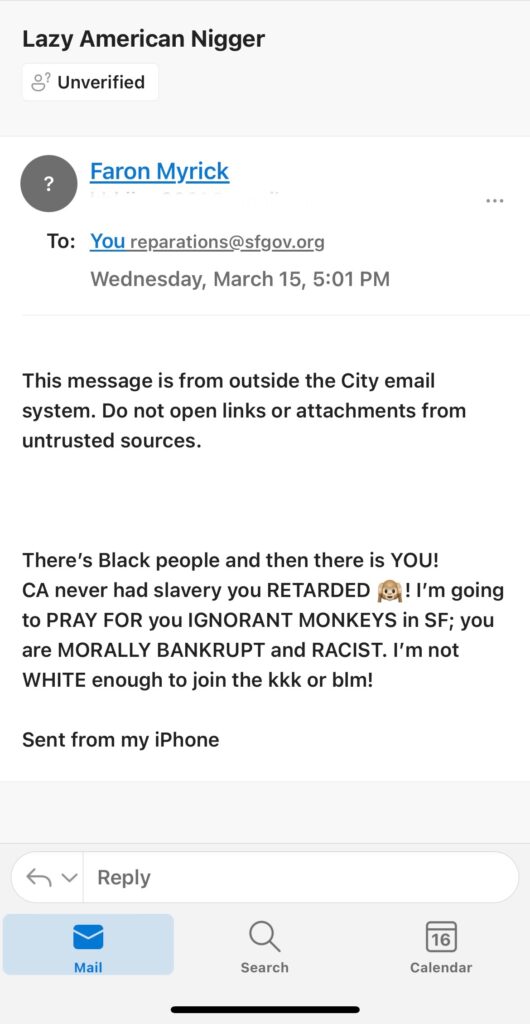
Davis said most of the negative emails and voicemails have been received by SF HRC staff, but were aimed at committee members and have been turned over to police.
When Black News & Views reached out to the San Francisco Police Department to inquire about the threats, SFPD Assistant Chief David Lazar said by phone, “The Human Rights Commission has turned over two or three emails to the SFPD, and we are looking into it.” He added, “We take these kinds of threats very seriously.”
Lazar also said that the Special Investigations Division is being assigned to look into the comments.
“Since the initial article covering the proposals of the African American Reparations Advisory Committee went viral in January, the San Francisco Human Rights Commission has received hundreds of inquiries, both from individuals wanting to know if they are eligible, and those with hostile hate speech, bullying, harassing or threatening committee members,” said Brittni Chicuata, the SF HRC’s director of economic rights.
“Committee members have received anonymous mail, threatening calls on their personal devices and bullying via social media,” Chicuata added. “It seems that every time a new wave of news articles highlighting the recommendation to distribute cash circulate they inspire people to share their nastiest thoughts on why Black Americans are unworthy of redress for the very specific harms they’ve experienced right here in San Francisco. This week has been no exception following Tuesday’s hearing.”
Despite the alleged intimidation and threatening emails and phone calls, the AARAC pushed forward with presenting its plan to the full Board of Supervisors.
Eric McDonnell, the AARAC chairman, led the effort inside the San Francisco Board of Supervisors chambers, and each of the 12 members individually committed support for the Draft Plan.
Supervisors Dean Preston and Raphael Mandelman, who are white, both discussed reparations payments that their families received for loved ones who were killed in Nazi internment camps during World War II.
Hollins, AARAC vice chair, said she was especially moved by the commitment expressed by Supervisor Connie Chan, chair of the Budget Committee, who vowed to take a closer look at a workable fiscal amount for reparations.
“It was a pretty significant moment because considering there is a projected budget shortage in San Francisco … and statewide, it was important to get her support of our plan.” Hollins said.
There have been 60 community meetings over the past year and a half over the reparations question, but this was the first public hearing before the full San Francisco Board of Supervisors.
Submission of the final report by the AARAC is due by June 30. Then the San Francisco Board of Supervisors is expected to review and discuss the report again at their September 2023 meeting. No word yet as to whether or not a vote will be taken at that meeting.
For more information, visit https://www.sfreparations.org or email reparations@sfgov.org.

